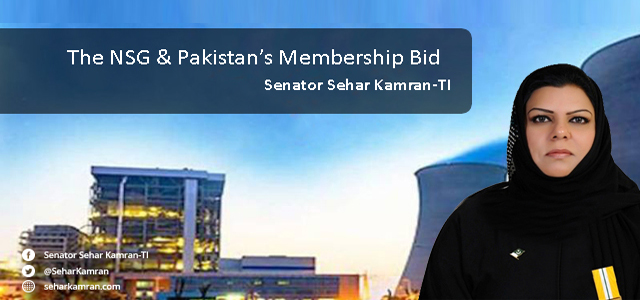By Senator Sehar Kamran (TI)
September 12, 2016
 Pakistan has recently applied for the membership of the Nuclear Suppliers Group (NSG). Much has been written on the subject, but as is always the case with matters of such complexity, much more remains unsaid. In the context of the upcoming plenary session of the group, it has become exceedingly important however that these conversations take place.
Pakistan has recently applied for the membership of the Nuclear Suppliers Group (NSG). Much has been written on the subject, but as is always the case with matters of such complexity, much more remains unsaid. In the context of the upcoming plenary session of the group, it has become exceedingly important however that these conversations take place.
The NSG is part and parcel of a series of mechanisms that feed into the international non-proliferation regime. Membership of the NSG allows a state potential access to the technology and fuel – particularly in the context of nuclear energy – that can move it into the future in leaps and bounds.
Pakistan has operated secure and safeguarded power plants for over 40 years – despite the withdrawal of vendor support but the current electricity mix is only 4.3% or 2200 MW. Given the extreme shortages we currently face, Pakistan has ambitious plans to expand its nuclear energy profile, as outlined in the Nuclear Vision 2050, whereby we plan to increase generation to 40,000MW. Thus far, all of Pakistan’s nuclear power plants have been operating under IAEA safeguards, and the country remains committed to synergizing its efforts with nuclear supplier cartels to harness this vast potential. Without access to the NSG however, this process becomes very difficult.
The fact that Pakistan is not party to the Non-Proliferation Treaty has been the reason cited for its exclusion to date. What this argument does not consider however, is the recent push for the unilateral entry of India into the Group, particularly by the United States, or even the Waiver that it was granted in 2008 to circumvent this regime altogether. What is also not considered is the fact that in keeping with the spirit of this regime, and reiterating Pakistan’s commitment to its principles, the country has suggested a Strategic Restraint Regime as well as bilateral moratorium on nuclear testing, and both these overtures have been met with silence.
Now I believe that one of the aims when establishing the NSG was also to engage into the non-proliferation regime countries that were advanced in nuclear sector but were not party to the NPT. Pakistan has an advanced nuclear program, and has had one for approximately four decades. It has the experience, expertise, credentials and immense untapped market potential, in addition to the manpower, infrastructure and ability necessary to supply NSG controlled items. Short of being a signatory to the NPT, it possesses every quality to render it an invaluable addition to the group. Pakistan has not only the potential to become a recipient but also a supplier of a full range of nuclear technology for peaceful purposes. And unlike the second membership applicant – India – Pakistan has also not enjoyed the benefits of an exceptional ‘waiver’, and as such is also an important new market for NSG member states.
Pakistan’s application therefore, stands on solid grounds of technical experience, capability and well-established commitment to nuclear safety and security, as well as great potential for actual growth. We currently provide a market that is larger than that of the UK, France and Germany combined!
Furthermore, what we often overlook is that while many non-proliferation experts discuss the matter of the NSG membership from technical, legal and procedural viewpoints, they, perhaps inadvertently, deemphasize the political aspect which remains a dominant factor in shaping policies of key NSG members. Put simply, for several years now the political and economic interests have influenced decisions and policies to a far greater extent than technical, legal and procedural guidelines. Had it not been so, we would not have witnessed the American nuclear deal with India and the subsequent Waiver in 2008.
There would also not be such disproportionate support for the unilateral entry of India into this prestigious group, despite the fact that the country has failed to uphold an alarmingly significant number of its commitments that were pre-conditions to the Waiver, including the separation of its civil and military nuclear facilities. Geopolitical and geo-economic objectives continue to create space for exploiting loopholes in NPT provisions and NSG guidelines. The unfortunate reality remains that despite its hefty portfolio, Pakistan continues to be sidelined and neglected.
It is also important to remember that today, the non-proliferation regime and the various multilateral arrangements working under its umbrella are faced with a host of challenges, at the heart of which is their relationship with de-facto nuclear weapon states (such as Pakistan and India), and how to incorporate them into the mainstream without impinging upon the goals and objectives of NPT regime.
Given the challenges, the question that presents itself is whether there are any ‘alternative’, pragmatic approaches to the question of the NSG membership of non-NPT, and how would they be applied? Will the international community oversee the continuation of an ‘exceptional’ approach, or will applications be tested against singular criteria in a uniform manner, particularly when discriminatory approaches have not only aggravated regional imbalances (and Pakistan’s security concerns) but also undermine the underlying principles of the non-proliferation regime?
Pakistan currently faces the worst energy crisis in its history, hindering its capacity to deliver on various socioeconomic and industrial development programs, despite the fact that it has been a highly responsible nuclear power. Pakistan’s civilian nuclear programs extend beyond the realm of energy to include cancer diagnoses and treatment, agriculture, food preservation, and water management amongst others. Pakistan has also made modest contributions to IAEA’s activities by sharing its experience and providing services of experts in diverse technical areas such as nuclear radiation, transport and waste safety, nuclear security, application of nuclear technology in agriculture, medicine, industry and nuclear energy.
The clearest example is that of the 18 nuclear medicine and oncology hospitals currently being operated by the Pakistan Atomic Energy Commission, that are a source of solace not only for Pakistani people, but also the people from other poorer or war-torn parts of this region, despite their increasingly insufficient capacity.
All imbalances can be remedied however, and we remain hopeful that NSG member states will consider all these factors as they work towards a criteria-based approach for membership of non-NPT states.
Same version of the article appeared in The Nation
Same version of the article appeared in CSSMENTOR


